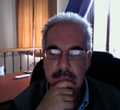Readers of this blog may begin to think that I have a personal antipathy for New York Times editorialist Stanley Fish. I don’t, really. Don’t even know the guy. And yet, somehow he manages to get criticized in writing by yours truly more often (and certainly more harshly) than Richard I-don’t-know-what’s-wrong-with-Bill-Maher-but-I’ll-endorse-his-award Dawkins.
The other day I went to a talk about the fall and revival of metaphysics, given by Sebastian Kolodziejczyk at the Graduate Center of the City University of New York. Metaphysics these days has a bad reputation, even among philosophers, so I was aware of its 'fall' but I was rather curious about the possibility of a 'revival'.
Being a skeptic is a rather lonely art. People often confuse you for a cynic, and I’m not using either term in the classical philosophical sense, of course.
Scientists are often assumed to be obsessed by definitions. After all, if you cannot precisely define a concept, say what a planet is, or what a biological species is, you literally don’t know what you are talking about, and how can you then possibly do science using that very same concept? And yet, the practice of science is very different, and to a surprising extent does not seem to depend on definitions of its objects of study.
A few days ago a local skeptic group here in Brooklyn organized a roundtable discussion on the concept of the paranormal. We thought this was going to be a chat about what people mean by that term, how one goes about investigating alleged cases of paranormal happenings, and so on.
We were in for a surprise. Turns out that a couple of real believers in the ghosts and the afterlife showed up, a somewhat rare opportunity to sit down with “the other side” and have a probing conversation to find out about what brings people to believe weird things.
 Neil Tyson And The Value Of Philosophy
Neil Tyson And The Value Of Philosophy What Does It Mean For Something To Be Metaphysically Necessary?
What Does It Mean For Something To Be Metaphysically Necessary? David Hume And The Missing Shade Of Blue
David Hume And The Missing Shade Of Blue Is Theologian Alving Plantinga For Real? Alas, It Appears So
Is Theologian Alving Plantinga For Real? Alas, It Appears So






